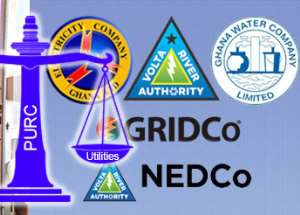
Ghana Water Company Limited (GWCL), Volta River Authority (VRA), Electricity Company of Ghana (ECG) and the Ghana Grid Company Limited (GRIDCo) are seeking tariff increases that amount to over 200 percent.
GWCL is seeking 124 percent increase in its tariff from GH¢1.78 for 120 gallons of water (5 barrels) to GHÈ»4 for 120 gallons of water.
When the increases being sought by ECG, VRA and GRIDCo are computed together, it will increase electricity tariff from 44-50 pesewas per kWh to 102-99 pesewas per kWh.
For electricity, ECG is seeking 101 percent increase; VRA wants 108 percent increase while GRIDCo seeks 31.26 percent, and if the three are computed it will result in over 100 percent increase in electricity tariff.
The Public Utilities Regulatory Commission (PURC) is to scrutinise the proposals and determine what increases the utility providers deserve.
VRA has proposed that its current Gh14.6 pesewas per kilowatt hour of power generated should be increased to Gh30.34 pesewas, representing 108 percent increase.
On the other hand, ECG is seeking approval from Gh16.45 pesewas to Gh35.5 pesewas per kilowatt of power while GRIDCo wants its Gh4.0453 pesewas per Kilowatt hour of electricity increased to Gh5.31 pesewas per kWh, an increase of 31.26 percent.
At the first stakeholder engagement organised by the PURC on major tariff reviews, which takes place every two years, ECG, VRA, GRIDCo and GWCL explained why they needed increases.
Kofi Ellis, Planning and Business Development Manager at the VRA, in a presentation, listed some projects aimed at adding more megawatts to the national grid in the short term.
He noted that by the year 2030, demand for electricity could rise to 5,000 MW in a case of low demand while high demand situation could rise to 9,000MW.
He explained that total power to be generated by Independent Power Producers (IPPs) that have shown interest in Ghana’s power sector amounts to 5,699MW.
He noted that the current tariff levels are not attractive enough to the IPPs.
According to him, it costs Gh26 pesewas to buy fuel to generate one Kilowatt hour of electricity while Ghanaians currently pay Gh14.6p per kWh.
Mr Ellis therefore said Gh30.34 pesewas per kWh was necessary to enable VRA cover the cost of producing power.
Ebenezer Baiden, member of ECG tariff team, also explained that various projects are being undertaken to improve its operations.
He said the increase was needed to enable ECG serve customers better, adding that as of June this year, ECG had recovered GHȻ95 million of its debts.
He said the company is determined to collect all its debts.
The ECG tariff member stated that ECG has invested GHȻ1.45 billion into major projects across it operational areas to improve service delivery.
He stated that ECG needed the increment to enable it pay for power purchases and the cost of existing and new power plants.
Kofi Owiredu, an economist at GRIDCo, outlined the numerous projects being undertaken and explained that the company had taken loans and needed the increases to be able to pay back the loans.
Responding to questions on the power badges, he said work was nearing completion.
Kenneth Ennin, Commercial Manager of GWCL, said GWCL needs GH¢698 million per year for expansion projects.
He explained that it costs GH¢8 to produce 120 gallons of water (5 barrels) but GWCL sells that water for GH¢1.78, making operating cost exceed tariff.
According to him, 48 percent of their revenue goes into paying electricity bills because their stations operate 24 hours.
The pollution of raw water sources by illegal miners means the company has to use more chemical to threat the water, resulting in high cost of operations, he mentioned.
This, he said, is also destroying their pumps because highly polluted water cannot be treated by their machines.
- Myjoyonline




 Akufo-Addo’s govt is the ‘biggest political scam’ in Ghana’s history – Mahama ja...
Akufo-Addo’s govt is the ‘biggest political scam’ in Ghana’s history – Mahama ja...
 Performance Tracker is not evidence-based — Mahama
Performance Tracker is not evidence-based — Mahama
 Four arrested for allegedly stealing EC laptops caged
Four arrested for allegedly stealing EC laptops caged
 $360 million IMF bailout not enough for Ghana – UGBS Professor
$360 million IMF bailout not enough for Ghana – UGBS Professor
 Shrinking Penis Allegations: Victim referred to trauma hospital due to severity ...
Shrinking Penis Allegations: Victim referred to trauma hospital due to severity ...
 Adu Boahen Murder: Case adjourned to May 9
Adu Boahen Murder: Case adjourned to May 9
 ‘I've health issues so I want to leave quietly and endure my pain’ — Joe Wise ex...
‘I've health issues so I want to leave quietly and endure my pain’ — Joe Wise ex...
 Let’s help seek second independence for Ghana before NPP sells the country – Law...
Let’s help seek second independence for Ghana before NPP sells the country – Law...
 New Force aims to redeem Ghana and West Africa — Nana Kwame Bediako
New Force aims to redeem Ghana and West Africa — Nana Kwame Bediako
 ‘I didn't say I would buy Ghana if voted against; I said I’ll buy it back from f...
‘I didn't say I would buy Ghana if voted against; I said I’ll buy it back from f...
